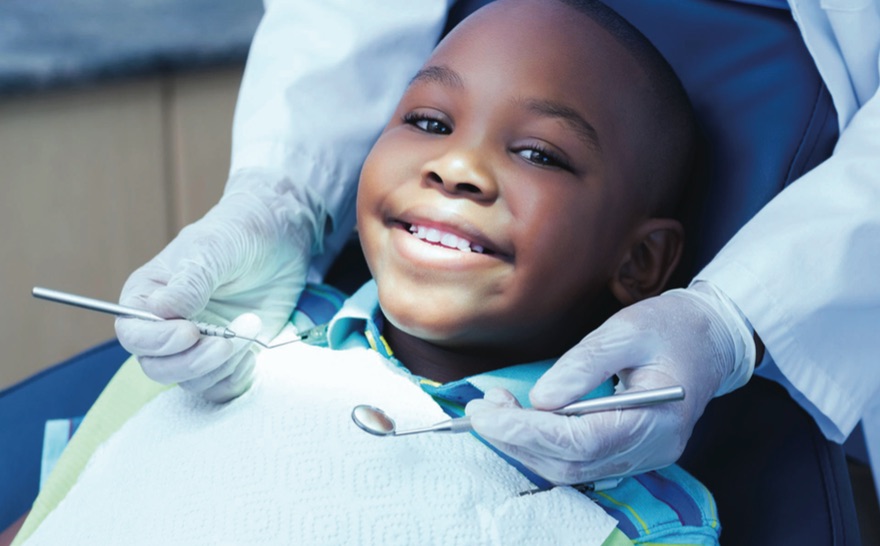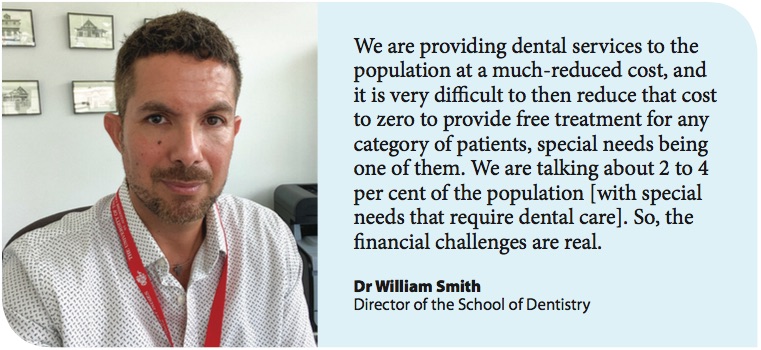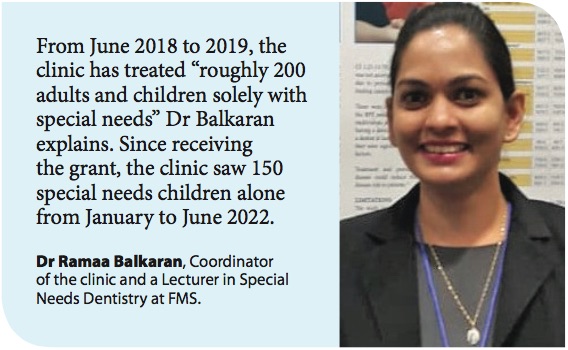
Provides low cost and free oral health services despite scarce funding and resources
In 2011, there were 52,244 people living with a disability in Trinidad and Tobago – 3,302 were children. That’s about 1 per cent of all children in the nation. Some of them have an additional challenge – accessing basic medical care. That includes dental care. To meet this urgent need, the School of Dentistry at The UWI St Augustine’s Faculty of Medical Sciences (FMS) opened a Special Needs Dental Clinic offering the full range of dental treatment to adults and children with special needs. The clinic is the only university-based clinic dedicated to the care of these kinds of patients in the Caribbean.
Special needs dental patients are those who present with “conditions that require special methods or techniques to prevent or treat oral health problems, or where such conditions necessitate special dental treatment plans,” according to the Royal Australasian College of Dental Surgeons definition. Last month, it was reported that the clinic had received a grant of $90,000 from Community Chest Ltd (CCL), a well-known local NGO. “This grant has allowed these children to have all their treatment done at no cost,” says Dr Ramaa Balkaran, Coordinator of the clinic and a Lecturer in Special Needs Dentistry at FMS. From June 2018 to 2019, the clinic has treated “roughly 200 adults and children solely with special needs” Dr Balkaran explains. Since receiving the grant, the clinic saw 150 special needs children alone from January to June 2022.
It was in January of this year that Dr Edmund Chamley, Chairman of CCL, found the clinic’s services to be a match for their goal of serving children from low-income families and made the contribution.
“We do cleanings, fillings, root canals and extractions, even extensive replacement of teeth. Some children need full replacement because all of their adult teeth have gone. All of that is covered currently with that grant,” said Dr Balkaran.
Among the patients of every age treated at the clinic are long-stay patients, those institutionalised for mental health issues, patients receiving radiation or chemotherapy, patients with physical and intellectual disabilities, and those who are medically compromised.
“The dentistry doesn’t change, because the teeth are the same,” says Dr Balkaran. “What changes is the way that we accommodate these patients. It may mean that we have to spend more time doing behavioural therapy, such as ‘tell, show and do’ to describe everything we’re doing, or maybe turn off the lights if they have sensory issues, or we have special chairs for them.”
For Dr Balkaran and Director of the School of Dentistry Dr William Smith, the grant from CCL came at a crucial time. The school has been giving dental care to patients (with and without disabilities) despite shrinking resources and funds, and balancing the activities of the clinic while educating students.
“We are providing dental services to the population at a much-reduced cost, and it is very difficult to then reduce that cost to zero to provide free treatment for any category of patients, special needs being one of them,” says Dr Smith. “We are talking about 2 to 4 per cent of the population [with special needs that require dental care]. So, the financial challenges are real. We're trying to cope with them as best as we can.
“Dr Balkaran, in her own small way, is improving not only the quality of life, but the general health and wellbeing of these patients,” he says.
Opened in 2009, the Special Needs clinic was repurposed from an HIV/AIDS clinic. The dental clinic was established by Dr Salvación Barclay, a former lecturer with the School of Dentistry. She is credited with negotiating with the North Central Regional Health Authority (NCRHA) to provide the clinic space to treat patients with special needs. Dr Balkaran was appointed coordinator of the clinic in 2018 after Dr Barclay’s retirement.

Dr Balkaran speaks about the positive contribution dental health can make in people’s lives, benefits that go beyond their teeth. Dr Smith agreed and noted that in addition to the reduction in pain and suffering arising out of oral diseases, it can have a positive effect on patients’ systemic health.
“Research has shown a relationship between poor oral health and cardiovascular and other non-communicable diseases,” he says.
Dr Smith advises that improving the oral health of both special needs and the general population would support the Ministry of Health’s goal to reduce the incidence of non-communicable diseases in Trinidad and Tobago. Adequate resources and appropriate funding for good oral health may reduce hospital admissions and government spending on treating diseases in the long term.
In the meantime, even with its limited resources, the Special Needs Dental Clinic provides a standard of quality healthcare and increased life expectancy for neglected and low-income patients.
“Quality of life is not just for persons with a disability, but it also extends to their family and support system,” Dr Balkaran says.
Children and adults who have special needs or a disability, as well as their parents or caregivers, can access free or low-cost dental care services at the Eric Williams Medical Sciences Complex Special Needs Dental Clinic in Mt Hope. To make an appointment, contact Dr Ramaa Balkaran at 645-3232, ext. 4038; 645-7816; 645-4352.